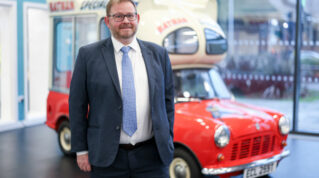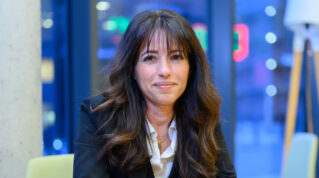Ellie Costello is at the front of a growing movement against the “one-size-fits-all” education system that creates, she says, kids who cannot cope in school.
Square Peg, the parent support organisation she leads, is particularly concerned by the top-down pressures schools are facing to bolster attendance. This forces “square pegs” to fit round holes that damages “the peg, not the hole”.
Many heads will challenge that view – and it is clear children not being in school leads to its own dangers – but Square Peg’s mission is one that can’t be ignored.
Persistent absenteeism (where pupils miss 10 per cent or more classes) doubled from 10.9 per cent in 2018-19 to 22.5 per cent last year. Getting those children back in class is creating a battleground between schools and frustrated parents.
Costello says parents like her are seen in education circles as an “irritation” who “get in the way of children’s learning”.
She has spent the past two years “networking [her] socks off” to raise the challenges that school refuser families face amid a “relentless focus on data” and “poor understanding of complexities at play”.
But Covid has at least legitimised attendance as an area of concern, she says. “Suddenly, we’ve gone from nobody, to everybody wanting to talk about attendance.”
But this has unleashed a bigger stick with which to beat families and hold the sector to account.
Costello believes the solutions lie in making schools more inclusive and has just co-authored a handbook, Square Pegs, helping them do so.

Harmful narratives
Her journey of fighting on her children’s behalf led her away from a promising career in television production – she worked on Poldark and Holby City – towards supporting other struggling parents.
Her son and daughter, now aged 17 and 14, are at a “tiny specialist school on very expensive [education, health and care plans]. But that was “never the plan”.
Costello’s son was born with a rare condition that left him in chronic pain. He became “mentally unstable” while still at primary age – something still “really hard” for Costello to admit – and both her children went on to become school refusers.
The eventual diagnoses for them was “developmental trauma… normally seen in children who are abused and neglected”. It was a “tough freaking label” which Costello fought against.
“It would have been easier for them to be diagnosed autistic, because at least there are some pathways to support and understanding. Complex trauma diagnosis broke me as it happened on my watch and despite my efforts to find support for my kids (to no avail) on top of the pressure of being threatened with fines or prison for non attendance.”
She was hopeful at first that it was a phase they would grow out of and bought into “harmful narratives” such as “children always bounce back”.
“But you wear down that resilience and they go into a hole. It’s a really scary, dark place to have a nine-year-old with such escalating needs that they’re harming themselves out of sheer despair.”
Her son’s “school refusal label” also irked Costello, because she knew he was not doing it wilfully but had serious levels of need.
Rather than prioritising those needs, the education system was focused on getting him back to school – with national conversations around attendance dominated by truancy and exclusions.
At the time, the coalition government was introducing parental accountability measures, tightening up on term-time absences and slashing support services. Then the Children and Families Act 2014 introduced a SEND support system without adequately funding it.
Costello found it “eye-opening” to be told by her son’s primary there was “very little” they could do for a school refuser. The waiting list for an NHS mental health appointment was at least two years.
“All I knew was that I had an eight-year-old whose top-level needs – the one people were paying attention to – were attendance and anxiety. We were led to believe school refusal was an emotional-based disorder, and we were the only ones in the world struggling with attendance.”

Not fine in school
Social media allowed Costello to connect with other parents, at first through a closed forum set up in 2018, Not Fine in School.
The group’s name reflects how some parents, herself included, are told their children are “fine” when they are at school but display challenging behaviours at home.
Costello’s son had good grades and was quiet in school; at home, he stopped eating, talking, sleeping and washing.
She claims attendance barriers faced by parents often relate to unmet SEND, excessive academic pressure, overly strict behaviour policies and an irrelevant curriculum.
But the government’s solution has been to take a tougher stance. Proposals in the shelved schools bill and last year’s fines and registrations consultation tightened existing policy around attendance enforcement.
Last year, after the Department for Education issued its new guidance and the children’s commissioner launched her 100 per cent attendance drive, membership requests at Not Fine in School soared by 70 per cent to more than 37,000.
Costello says families started reporting an immediate increase in fines and a drive to being back into school full-time as soon as possible. This “massively destabilised kids attending as best they could part-time”, she says.
She believes schools’ policies are now a mixed bag, with some “coercively refusing to authorise absence, jettisoning families into fines and prosecutions”, while others take a more conciliatory approach.

Covid’s legacy
Through her engagement with Not Fine in School, in 2019 Costello met Fran Morgan who founded Square Peg, a community interest company funded by donation.
Costello joined Square Peg in 2020 and took over the organisation in 2022 as Morgan stepped into retirement.
Ironically lockdowns, a shock to millions of parents, did not feel much different for her as she’d spent six years “non-electively homeeducating”.
She says DfE ignored Square Peg at first as “we were not seen as an official stakeholder”.
There was an assumption by schools at the time, says Costello, that “attendance would go away as kids got used to going back to school”.
But following pressure from other groups such as The National Children’s Bureau and ASCL, the school leaders’ union, Square Peg has met DfE teams to discuss attendance barriers.
Costello believes the department’s “top-down” approach can “pit schools, parents and children against each other”, creating stress on leaders.
And she believes it is “chasing the wrong key performance indicators. We’ve prized attainment above all else in the belief that that equals social mobility. That’s a complete lie. You can have a fistful of qualifications and be divorced three times, mentally unwell, and in insecure housing aged 50, going ‘pop’.
“It comes back to learning how to navigate the emotional world, and negotiating relationships with others. How do we disagree agreeably? These skills that employers are crying out for aren’t being delivered – at such a detriment to our children.”

‘Lack of tolerance to diversity’
Costello believes her son should never have been diagnosed with SEND, but that his mental health became so disabling it became an educational need.
She thinks more children are exhibiting similar symptoms of developmental trauma after exposure to “too much toxic stress for too long”. But schools often mistake this for “additional learning needs such as autism”.
Her son is now “frothing at the mouth in anger” that he ended up at a special school, and Costello believes the notion that some parents see EHCPs as a “golden ticket” is pernicious. “Nobody wants [their child to be labelled] as having special needs … All you want is for your kids to be happy and attending, so you can get on with your job and be their mum.”
The absence rate for SEND pupils has risen to such an extent since Covid that almost half of SEND pupils (40 per cent in secondaries and 49 per cent in special schools) are now frequently absent.
Costello believes some of this is an understandable stress response from children being “traumatically bereaved in Covid, or the existential threat of it”.
But it is also symptomatic of the lack of tolerance to diversity that has been woven through education by implicit messages in behaviour policies that “we all need to be the same”.
“Our children are holding up a mirror. They’re saying this isn’t working – and it’s not because I’m a snowflake or have a helicopter parent.”

Inclusion ‘not just a fluffy ideal’
She believes that if the DFE’s policy of providing more mainstream provision for children with SEND (rather than more special schools) is to work, “we need to really get up close with our implicit bias”.
“There has to be not just a will from schools to accept 20 of those [SEND] children, but an absolute philosophy of practice to make it work. Inclusion has to run through the values of the whole school, not be just a fluffy ideal.”
But she still wonders whether this is the solution, as her own children were “shoved through classes” in mainstream schools in the name of inclusion, to their detriment.
Costello also worries the relentless focus on data is leading to “othering and splitting” in schools through “well-intended” solutions such as SEND, attendance and behaviour hubs.
The solution instead involves “rethinking the curriculum, assessment, and the size and scope of education settings”.
But there is now, she believes, an “appetite to try to do things differently. The question is, are ministers brave enough to really run with that?”










Your thoughts